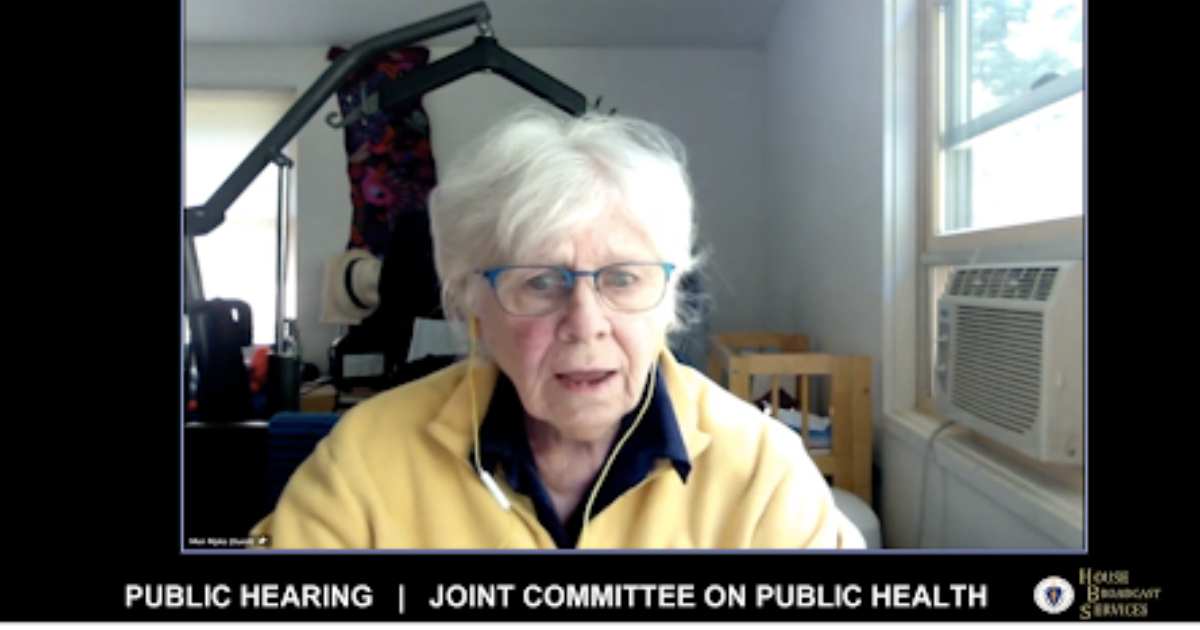Terminally Ill Patients and Caregivers Thank Legislators for Advancing End of Life Options Act
Bill Moves Favorably Out of Joint Committee on Public Health
Feb 8, 2024

ALS patient Meri Myles testifying at a Massachusetts Joint Committee on Public Health hearing in 2021.
Terminally ill patients and caregivers of loved ones who have died with unbearable suffering praised the Joint Committee on Public Health (JPH) for approving the End of Life Options Act (S.1331/
H.2246) Wednesday afternoon. The bill’s approval follows bill supporters’ riveting testimony at a JPH hearing last October.
Sponsored by Senator Jo Comerford, Representatives James O'Day, and
Ted Philips, and cosponsored by 84 other lawmakers, the bill would allow mentally capable, terminally ill adults to have the option
to obtain prescription medication they could decide to take to peacefully end intolerable suffering. New testifiers supporting the bill include:
“I offer my heartfelt thanks to the Joint Committee on Public Health Co-Chairs Representative Marjorie Decker and Senator Julian Cyr, and the other committee members who voted to approve the bill. My late wife Meri Myles, who was terminally afflicted with ALS when she testified remotely to the committee, would certainly be pleased,’” said Concord resident Mark Myles. “The prohibition on medical aid in dying is anything but ‘pro-life.’ No - it is pro-suffering, senseless, undignified, inhumane. It is torture.”
“We are very grateful for the leadership of Joint Committee on Public Health Committee co-chairs Representative Decker and Senator Cyr, as well as the lead bill sponsors, Senator Jo Comerford, Representatives James O'Day, and Ted Philips," said Melissa Stacy, northeast campaign manager for Compassion & Choices Action Network. “Terminally ill people who are eligible under this act are dying. Giving them the option to choose when they’ve had enough, to save them from excruciating suffering in their final days, is the compassionate choice. "
Nearly three out of four Massachusetts voters (73%) support the End of Life Options Act and nearly eight out of ten voters (79%) support the bill after they learn about its safeguards, according to a March Beacon Research poll. At least seven in 10 voters (70%-75%) in every state region support the bill, as do 79% of Democrats, 71% of unenrolled
voters, 68% of Republicans, 89% of strongly pro-choice voters, 68% of moderate pro-choice voters, a plurality of pro-life voters (47% vs. 43%), 68% of Catholic voters, 71% of Protestant voters, 68% of voters living with a disability, 76% of white
voters and 63% of voters of color.
A 2017 internal survey of Massachusetts Medical Society members showed they support the End of Life Options Act by a 2-1 margin: 62% support vs. 28% oppose (see page 9 chart here).
Medical aid in dying is an end-of-life care option in neighboring Vermont, and nearby Maine, as well as eight other states California, Colorado, Hawaii, Montana (via a state Supreme Court ruling), New Jersey, New Mexico, Oregon, Washington, and Washington, D.C.
A 2019 University of Pittsburgh School of Law report concluded the experience in the numerous states and Washington, D.C., where medical aid in dying is authorized, “puts to rest most of the arguments that opponents of authorization have made — or at least those that can be settled by empirical data. The most relevant data — namely, those relating to the traditional and more contemporary concerns that opponents of legalization have expressed — do not support and, in fact, dispel the concerns of opponents.”
The use of hospice care among Medicare recipients has more than doubled over the past two decades. Yet, studies estimate that nearly 70% of cancer patients who receive low doses of opioids to treat background pain (pain experienced for more than half the waking days during the previous week) still experience severe bouts of breakthrough pain. Cancer is by far the most common diagnosis among terminally ill individuals who qualify for medical aid in dying.

